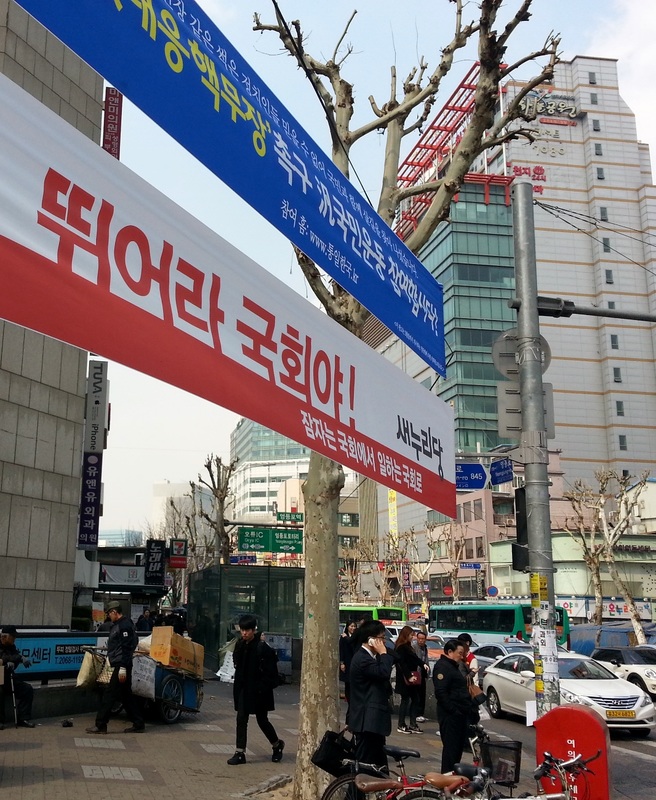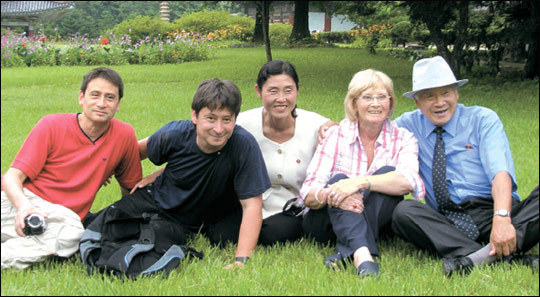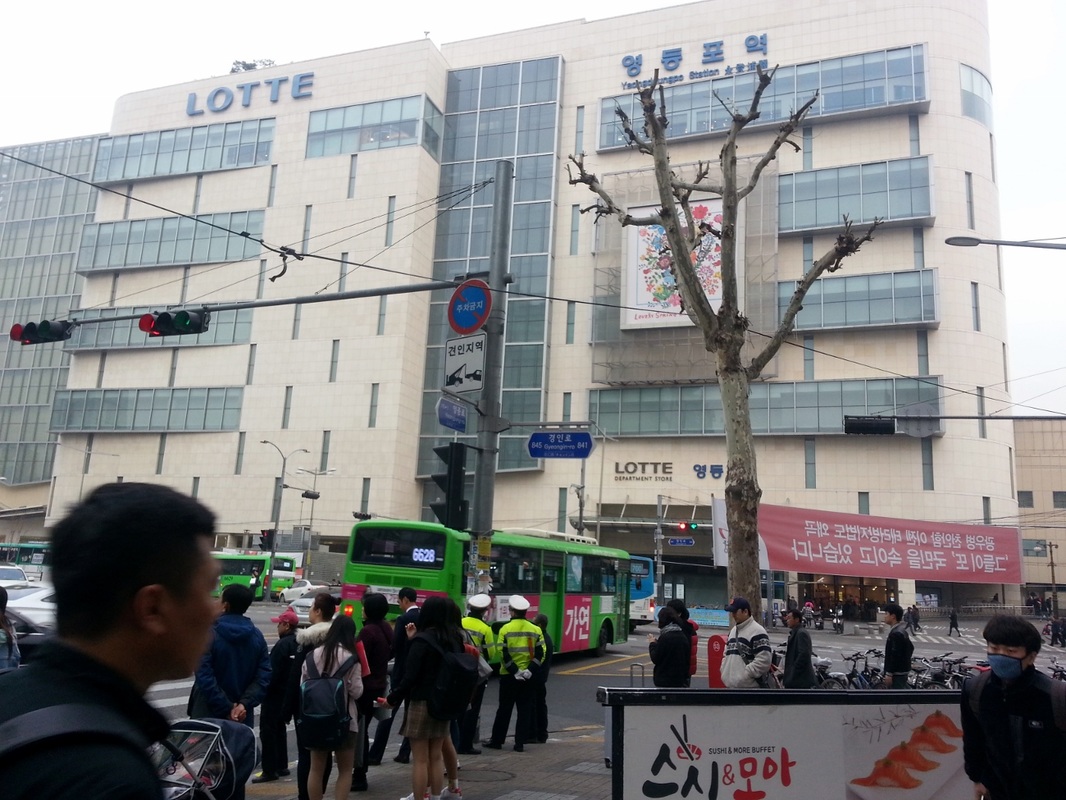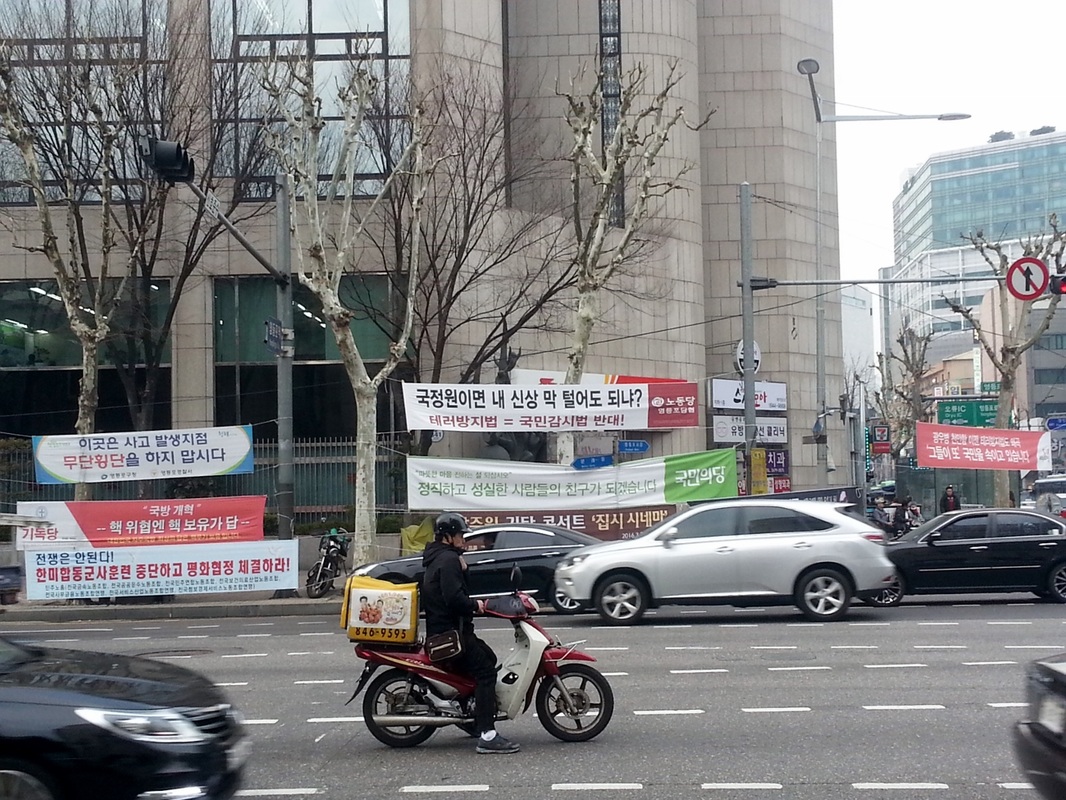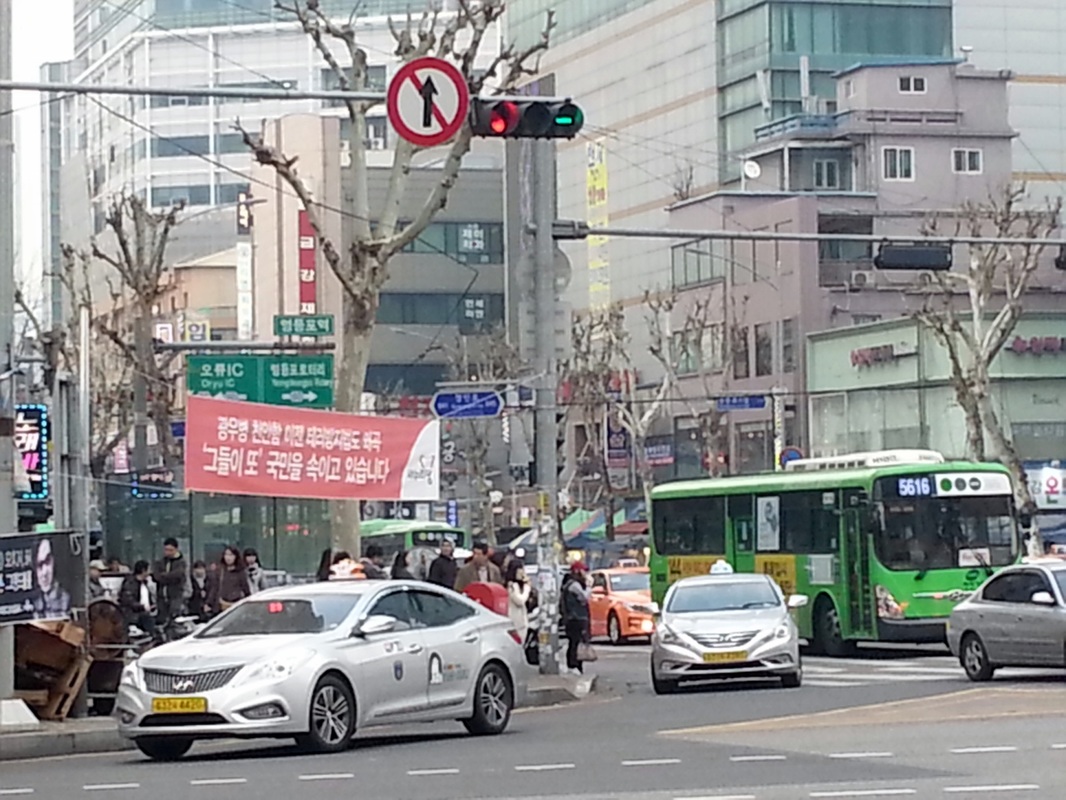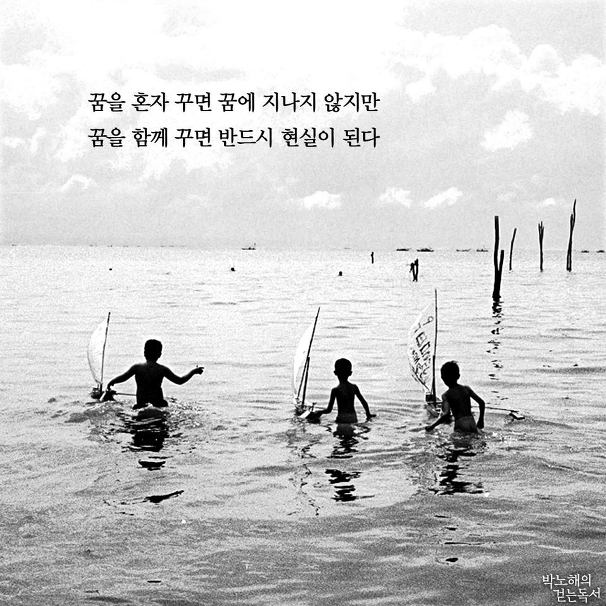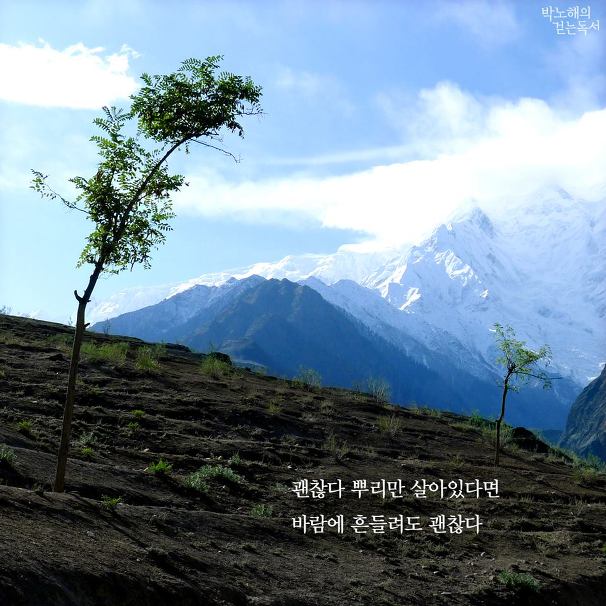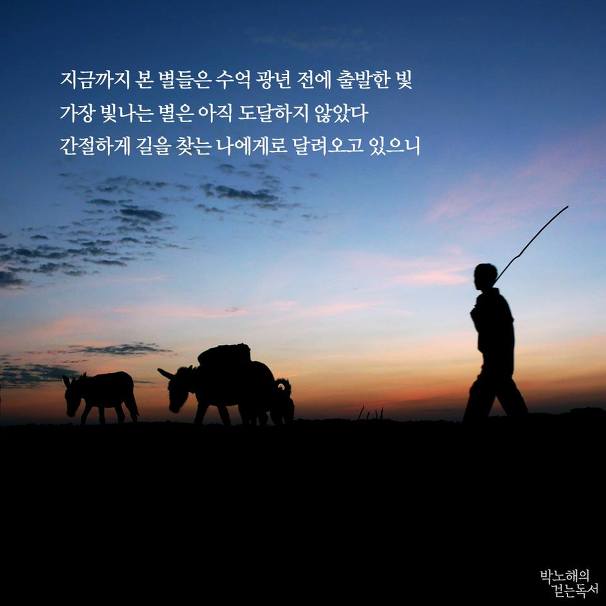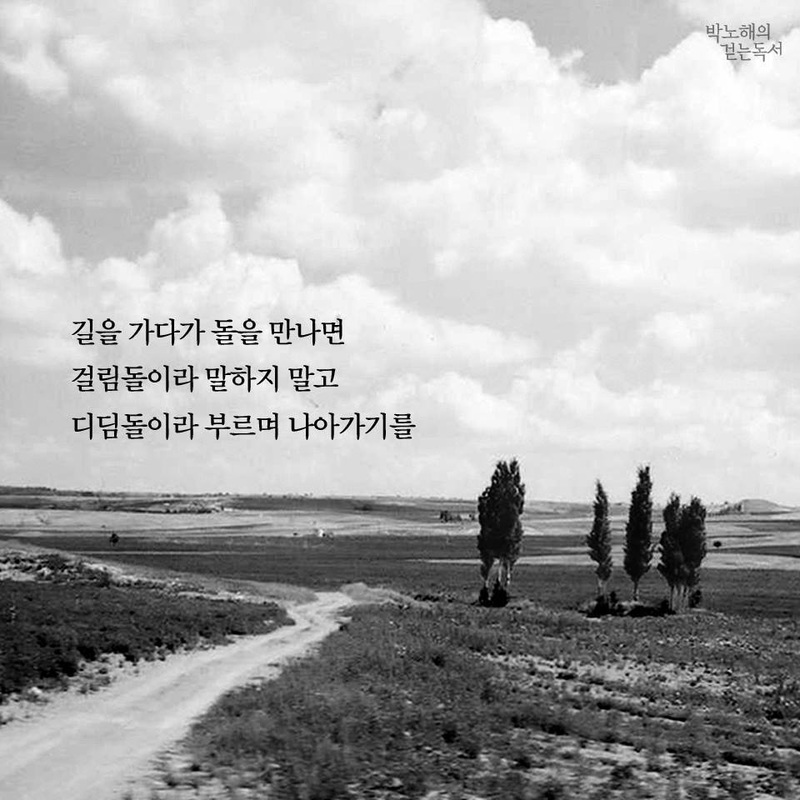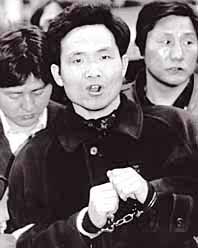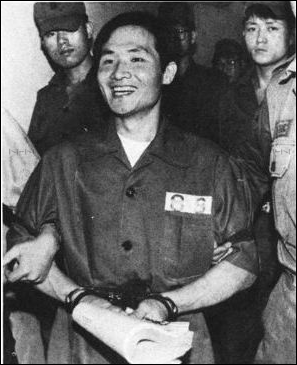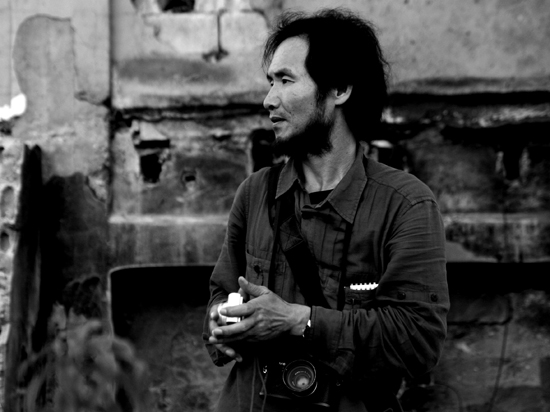South Korea’s National Assembly (국회) elections are coming up in April 2016. The last time, in April 2012, the “right-wing” Saenuri (New Frontier) Party won a majority of seats, foreshadowing the narrow victory by the same party in the presidential race in December 2012.
My impression is that the Saenuri Party (formerly called the Grand National Party, 한나라당) is differentiated from the main opposition Democratic Party (now called 더불어민주당) by being more strongly anti-North-Korea (i.e. more confrontationalist), more pro-U.S., and more in favor of a closed society at home. The Saenuri Party is mainly descended from General Park Chung-Hee’s Republican Party (공화당), and his daughter is now president.
Official campaigning is not allowed till March 31, which, in practice, means no teams of campaigners in matching uniforms chanting via louspeaker systems in public places, and no “noise trucks” blaring “Vote For So-and-So! Vote for So-and-So!” etc. Yes, campaigning in Korea is not much like campaigning in the USA. I find it all fascinating but most foreigners (and I presume Koreans) seem to resent the disruption of daily life and the added noise. The restriction on campaigning does not include political banners, which are everywhere.
Below is one banner I found from the right-wing Saenuri Party which I can translate and upon which I can comment.
First, it should be said that the opposition parties are making South Korea’s new Anti-Terror Law (테러방지법) a main issue of political attack. The Anti-Terror Law was passed in early March 2016, unilaterally by the ruling party, with no votes from the opposition. In fact, it was reported that no opposition National Assembly members were even present at the vote — All had boycotted the session in protest over the proposed law and over the government’s refusal to negotiate). Some question how different things really are from the 1970s in Korea (except for the society being much wealthier). Events like this….
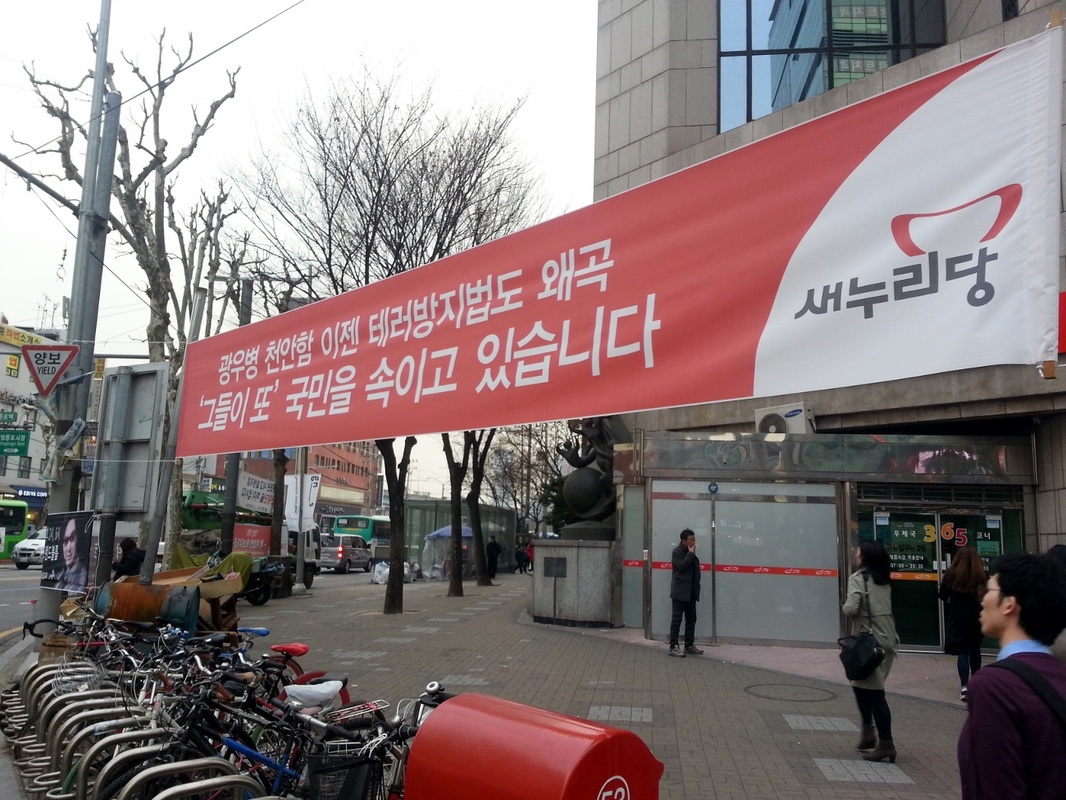
Across from Yeongdeungppo Rail and Subway Station (영등포역), southwestern Seoul and next to “Times Square” shopping center, mid-March 2016
Original Text of the Banner and My Translation
광우병 천안함 이젠 테러방지법도 왜곡
‘그들이 또’ 국민을 속이고 있습니다
[새누리당]
They lied about Mad Cow Disease,
They lied about the Sinking of the Cheonan,
And now they’re lying about the Anti-Terror Law.
They’re at it again. They’re up to their old tricks.
[New Frontier (Saenuri) Party]
South Korean politics is characterized by occasional political-frenzies during which it is difficult to figure out what’s truly going on. I remember, in 2011-2012, the political frenzy over the U.S.-Korea Free Trade Act (한미자유무역협정, usually called “한미FTA”). I remember the angry diatribes in public places, via megaphone, denouncing the Free Trade Act. The MERS Crisis of last year was another such incident, in a way, but is now long forgotten. The Sewol Disaster was another, the year before that. There are many others. (None of these had much or anything to do with North Korea, fearmongering about which is so prominent in the U.S. media.)
The Anti-Terror Law seems, from what I understand of it, to be a kind of Internet-Age (and “Terror Age”) update to the notorious National Security Act (국가보안법). The National Security Act allows for the imprisonment of those the government alleges they are “anti-state” without having committed any specific offense, a troubling concept to the democratic mind. Something around a hundred South Koreans a year continue to be charged and convicted under this law, even in the 2010s. This is soft political suppression in action. The high-profile banning of a small far-left political party in late 2014 and the jailing of some of its leadership may have used this law to justify the banning, I’m not sure.
Anyway, the red-and-white political banner above refers to two more such “frenzies” and the banner implies that “they” (the Left generally, presumably) “lied” about each.
(“Lie 1”). Mad Cow Disease (광우병). U.S. beef was banned for five years in South Korea during the left-wing government of Roh Moo-Hyun, 2003-2008. I interpret the U.S. beef ban to have been a proxy for the political impossibility of removing U.S. troops. It was claimed that U.S. beef was infected with Mad Cow disease, and quite a lot of people seemed to believe it, despite no Americans having died of Mad Cow disease. Even today, it is uncommon to see U.S. beef served in restaurants. For years, into the mid-2010s, the Lotteria fast food chain had a slogan on its burger wrappers in Korea, “Clean and Safe Australian Beef” (Americans, if they knew about the insinuation being made, would be hurt, like a friend insulting you behind your back). In response to this frenzy, all restaurants had to publicly notify customers on the origin of their meat products. I’ve only seen U.S. beef served in a restaurant once. It became common in grocery stores, though, after the lifting of the ban when a right-wing president came to power in 2008.
(“Lie 2”). The Cheonan (천안함 침몰 사건) was a South Korean Navy vessel sunk with 46 lives lost in March 2010, two years into the administration of “confrontationalist” South Korean President Lee Myung-Bak (Saenuri Party). The international consensus seems to be that North Korea sunk the ship deliberately for its own reasons that aren’t worth going into here. Conspiracy theories were around at the time purporting that North Korea did not attack and sink the vessel as alleged, alleging a coverup. These insinuations had some success in the popular mind. Only “68 percent of South Koreans trusted the government’s report that Cheonan was sunk by a North Korean submersible” in a 2011 poll (Wiki)..
(“Lie 3”). The Anti-Terror Law (테러방지법). Discussed above. Critics seem to be saying that the Anti-Terror Law is going to be used to “scale up” the state apparatus for suppressing political activity and speech. The Anti-Terror Law specifically allows, its critics say, for the government to actively monitor all online communications, comprehensively, without a warrant, including the enormous database of KakaoTalk, the national chat app, which almost all Koreans use. A Korean-American acquaintance of mine, resident of Seoul for almost twenty years, recommended me to use a certain Russian chat app instead, “Because the government can’t access the database; it’s in Russia.”
Some more shots of the area around the Saenuri banner (“The Liars are at it Again”) . Across the street is Yeongdeungpo Station (영등포역) in Seoul. The exact same banner is visible lower right below:
Below is the same scene from the other side of the street. Note the red banner in the lower-right:
Several other political banners are to be seen here. One from a left-wing party saying,
“Stop the Anti-Terror Law = Surveillance of the Citizenry Law!” (테러방지법 = 국민감시법 반대!)
Maybe even more interesting is the banner proclaiming “No War! Stop the US-ROK joint military exercises; Sign a peace treaty (formally ending the Korean War)!” (전쟁은 안된다! 한미합동군사훈련 중단하고 평화협정 체결하라!). The level of speech used here is the low form (반말 banmal), as you speak to someone whom you do not need to show respect towards. The red-and-white Saenuri Party banner (“Liars at it Again”) above is in a much more formal form (존댓말). This is because it is not addressing the “liars” but authoritatively asserting that they are liars. Saenuri, in its banner, is addressing its own support base and so uses a formal form to project an air of dignity.
Here is one more shot of the Saenuri banner, with a feel for how dense Yeongdeungpo is directly behind it. I failed to capture the magnitude of the Times Square Shopping Center, off to the left in the below and the size of a large stadium.
One more banner from Saenuri is across the street, sort of directly under the LOTTE sign in one of the above photos.
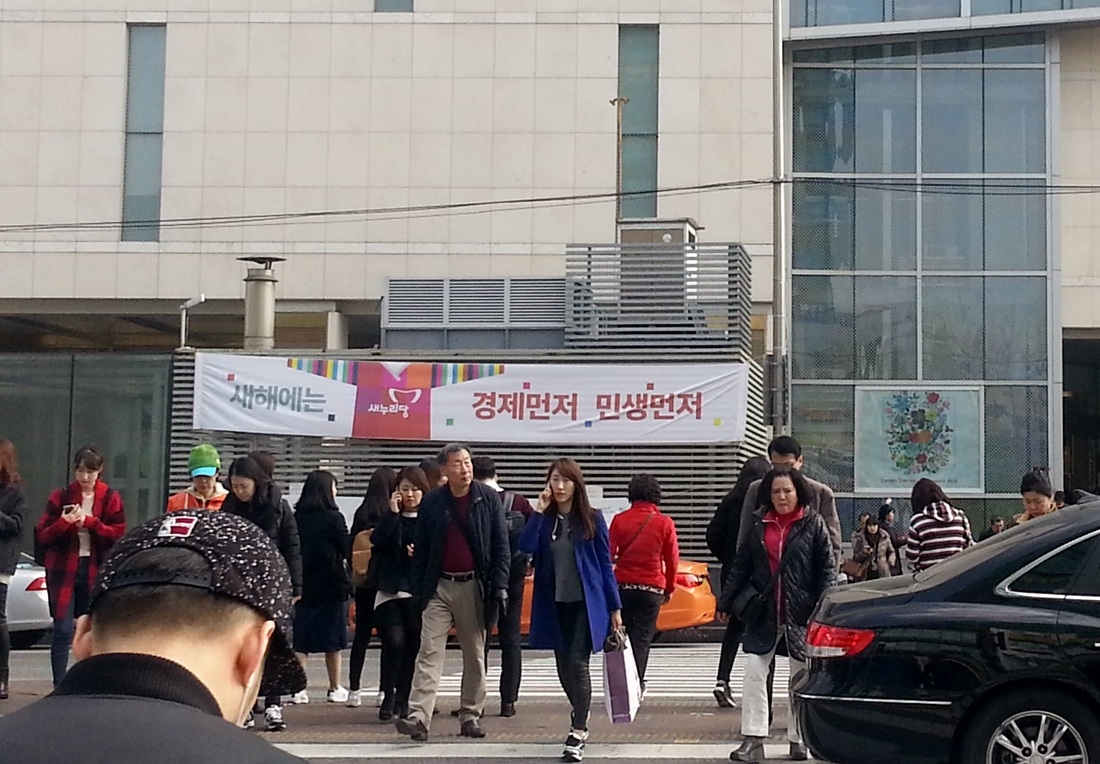
Yeongdeungpo, Seoul, March 4th, 2016 (sign still up as of March 28th)
새해에는 경제먼저 민생먼저
[새누리당]
In the New Year: Economy First, Livelihoods First
[New Frontier (Saenuri) Party]
As the main parties have the same rhetoric on economics, this particular banner is boring.
During the 2012 presidential campaign, I was living in Bucheon. Near my building were two banners next to each other, one from the Saenuri Party and one from the Democratic Party. I was amused greatly that the two banners had the exact same slogan on them, down to the exact same words. It was something about building a society based on 복지(welfare payments). The U.S. Republican Party, in many ways comparable to the Saenuri Party, would never use such slogans promising “more welfare.”
Another thing I remember about the 2012 race was the Democratic candidate Moon Jae-In (문재인), whose name I had great fun with, in middle school classes at the hagwon, because it sounds like “Problem Man” (문제인)… The problem for him was that he lost.

